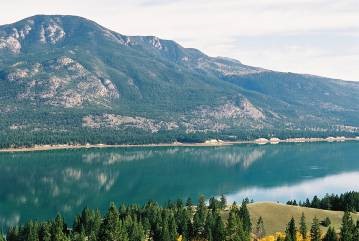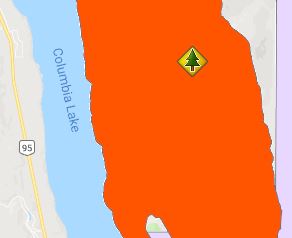East Side Columbia Lake Wildlife Management Area
Date Designated: September 12, 1997
Purpose: Conservation of a complementary area near the Columbia Wetlands WMA, providing important winter range for ungulates, staging areas for waterfowl, and vital habitat for many other species.
Size: 6,886 hectares
Region: Kootenay/Boundary
Nature and culture
Fish and Wildlife: This area provides extremely important winter range for ungulates such as Bighorn Sheep, Elk, Mule, White-tailed Deer, and creates a connectivity and migratory corridor between important habitat south and north of the lake. The area is also important for Grizzly Bear, Black Bear, Cougar, Coyote, American Badger, rare Flammulated Owls, Bald Eagle, Golden Eagle, Osprey and Red-tailed Hawk. Species dependent upon grassland or open forest habitat types at low elevations also frequent the WMA, such as Prairie Falcon, Townsend’s Big-eared Bat, Tailed Frog, and Rubber Boa. The north end of the lake is a waterfowl sanctuary and the south end is an important staging area for waterfowl, especially swans. There is a significant Burbot spawning site in a spring-fed creek at the south end of the lake.
Physiography, Climate and Vegetation: The WMA includes lake and lakeshore areas, wetlands, dry open grasslands and open Douglas Fir stands at low elevations, while Lodgepole Pine, Englemann Spruce and subalpine fir forests rise sequentially from low elevations to the highest ridges.
Planning and management
Information on management direction and possible restrictions on visitor activities are available from the Conservation Lands regional contacts.
Image
The East Side Columbia Lake WMA is located north of Canal Flats and includes much of the east shoreline of Columbia Lake.


